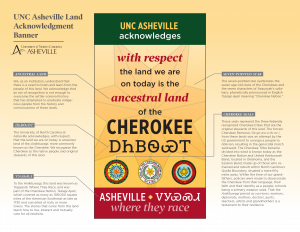Place is an integral part of our identities and carries with it our past, present and future. A land acknowledgment is a formal statement that recognizes the indigenous peoples and cultures as stewards of the land on which we and our institutions now reside.
More information on land acknowledgments and native lands:
- LandAcknowlegments.org
- Native Governance Center
- “Native Lands” – article by Associate Professor of Interdisciplinary Studies Trey Adcock
- Native Lands Map
UNC Asheville created its land acknowledgment to honor the Anikituwagi, more commonly known as the Cherokee. The land acknowledgment is read during occasions that bring our community together to remind us of those who came before us and the settler-colonial history that has attempted to eradicate indigenous people from the history and consciousness of these lands.
The three federally recognized Cherokee tribes are the Eastern Band of Cherokee Indians, United Keetoowah Band of Cherokee Indians and the Cherokee Nation.
ᏙᎩᏯᏍᏗ – Togiyasdi, Where They Race
The University of North Carolina Asheville acknowledges, with respect, that the land we are on today is ancestral land of the Anikituwagi, more commonly known as the Cherokee. We recognize the Cherokee as the native people and original stewards of this land.
To the Anikituwagi, this land was known as Togiyasdi, Where They Race, and was part of the Cherokee Nation, Tsalagi Ayeli, which covered as many as 108,000 square miles of the American Southeast as late as 1730 and consisted of sixty or more towns. The stories that come from this land teach how to live, interact and mutually care for all relations.
We, as an institution, understand that there is a need to listen and learn from the people of this land. We acknowledge that an act of recognition is not enough to overcome the settler-colonial history that has attempted to eradicate indigenous people from the history and consciousness of these lands.
The Eastern Band of Cherokee and UNC Asheville seek to affirm our work together to ensure a strong relationship rooted in relevancy, responsibility, respect and reciprocity. Therefore, as an institution UNC Asheville has a responsibility to commit its efforts and resources to the health and priorities of the Eastern Band of Cherokee Indians, the students who attend this university and all the varied Indigenous people who live in and around the lands this university is situated on. As these words are spoken and heard, we renew and reaffirm this campus as Cherokee homelands.
Read the full version of UNC Asheville’s Cherokee Land Acknowledgment.
Pronunciation Guide
Find the pronunciation guide for the short and full versions here.
(Click the image to download the PDF version)
